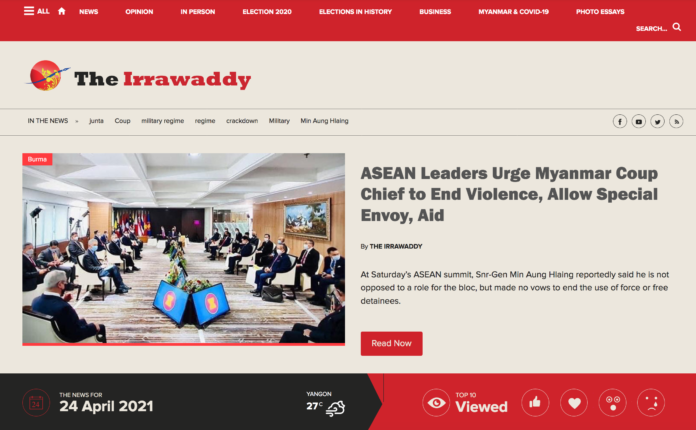Ruth Witmer
Hoosier State Press Association
After retiring last summer as publisher of the Commercial Review in Portland, Jack Ronald started working as a copy editor for The Irrawaddy, a news website in the Southeast Asia country of Myanmar.
Ronald has a long history of conducting training and working with news organizations from around the world — including as a Fulbright Specialist for the State Department in Myanmar in 2012 — and has kept in touch with colleagues.
He was checking on his friends and on news from Myanmar on The Irrawaddy a few weeks after he retired. At that point, the big story was Covid, how they were coping and the upcoming election.
“At the top of the page they said they were looking for a part-time copy editor-social media person. I dropped them a note and said I can do half this job, if you’re interested. I can do the copy editing part of it,” Ronald said. “Google me, you’ll find out more than you ever wanted to know.”
After an international Zoom call, they mutually decided to give it a try with the 10 and a half-hour time difference. Ronald said he was getting op-ed pieces, transcripts from a TV show they do and candidate profiles. Then, there was a military coup ousting elected leader Aung San Suu Kyi.
“The world turned upside down for Myanmar and turned upside down for me, too. I’ve worked at least a few hours, seven days a week since the first of February.”
The stories changed to breaking news. For typical days, it’s at least a couple of stories and refining the English of Facebook and Twitter posts chronicling the violence that has resulted in more than 700 deaths.
“The pace of violence is unpredictable. The emphasis is really on terrorizing the populace.”
There are now about three or four sites that are reliable for news in Myanmar, Ronald said, including The Irrawaddy.
“The state-controlled media is still going, but they’re of course just doing propaganda. There are no independent newspapers being published any more. All the papers I worked with in 2012 had to cease publication after the coup.” Ronald said staffers weren’t allowed to use the word regime or coup, and walked out rather than comply.
Staff for The Irrawaddy are in hiding, copy editors are in different countries. For journalists there, this is not the first time they’ve experienced a crackdown, detention and suppression.
“We have it so easy here where people are not actively working against you in the pursuit of information,” Ronald said.
“I think it’s safe to say that my sense of perspective is better than most people’s after I go through this. I don’t sweat the small stuff.”
aaa
Youngest will be far from the last
Editor’s note: This column originally ran in the Commercial Review March 31. The death toll has now topped 700, dozens of which are children.
Jack Ronald
Commercial Review (Portland)
Let’s talk about Khin Myo Chit.
She’s been on my mind for the past week.
Khin Myo Chit was three months past her sixth birthday, not much younger than my grandson Gabriel and my granddaughter Johanna.
Khin Myo Chit lived with her family in Chanmyathazi Township of Myanmar’s Mandalay region. Yes, I know that’s a mouthful. Many of the names of people and places in Myanmar qualify as a mouthful.
Khin Myo Chit was in her family’s home when soldiers and police kicked in the door a week ago Tuesday. Terrified, she ran to her father and jumped in his lap, telling him she was scared.
Then security forces loyal to the leaders of a military coup that seized power on Feb. 1 shot her.
Her father ran to the nearest medical clinic with his daughter dying in his arms. She did not make it.
Later, her family took her body and went into hiding. The regime’s security forces have recently been snatching the bodies of those they have killed, apparently in an effort to conceal the casualty count.
One week ago, Khin Myo Chit was buried in a Muslim cemetery with only close relatives present.
The strangest part of my daily routine for the past several weeks has been editing an update of the death toll. It occupies about an hour each morning, and it is unrelentingly grim.
First, I read through the copy provided by one of my colleagues on The Irrawaddy. I correct the English, rewrite sentences to make them clearer, and try to make sure that the final version is in compliance with the news outlet’s style manual.
Lately, I’ve also struggled to find new ways to say the same thing.
After all, how many ways can there be to say, “shot in the head”?
When Myanmar’s military seized power and arrested the democratically elected leaders of the country, they were met with overwhelming civilian opposition. And they responded to that opposition with brutality.
Confronted with demonstrations in the streets, the military called on snipers. Protesters quickly became target practice. Those who attempted to help the wounded or gather up the bodies of the dead became targets as well. And, more recently, the killing has become more random and more wanton. Pedestrians minding their own business have been killed. A teenager steps outside his house to get some water to help his mother with household chores and gets a bullet in the brain.
After I’ve read through the day’s inventory of new corpses, I attach what is known as the metadata, the stuff that makes it possible for search engines to find news on the internet. I struggle to find words to write a new headline and a new teaser. Again, it’s hard to say, “death toll rises” in a new and compelling way.
Then, finally, I give the story a slow read, sometimes out loud, to make sure that I’ve done it justice. That’s when the fate of someone like Khin Myo Chit is inescapable.
Last week was especially tough. The death toll as calculated by The Irrawaddy hit 327 — though it is probably higher because of the countless people who have been seriously wounded — and 22 of those slain were kids.
The task before me was to edit 22 brief profiles of all those under the age of 18 who had lost their lives so far.
Khin Myo Chit was the youngest, but she was far from alone.
And others will follow.
. . . . . . . . . . . . . . . . . . . .

Jack Ronald is the retired publisher of The Commercial Review, Portland, Indiana. In retirement, he has been working as a part-time copy editor for The Irrawaddy, https://www.irrawaddy.com, an independent news site out of Myanmar.
aaa




